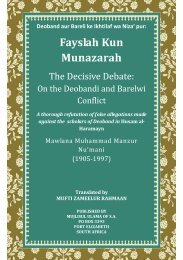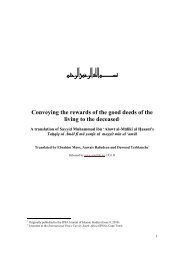al_etidaal_gn
al_etidaal_gn
al_etidaal_gn
You also want an ePaper? Increase the reach of your titles
YUMPU automatically turns print PDFs into web optimized ePapers that Google loves.
Sunnah, like i<strong>gn</strong>orant people as many people do today, the S<strong>al</strong>aah is considered to<br />
have been performed correctly and adequately.<br />
What acceptable opinions can be voiced by so-c<strong>al</strong>led enlightened brains, polished<br />
oratory and fluent writers in mas’aail such as these? For such a reason Sayyidina Ali<br />
(Radi<strong>al</strong>lahu anhu) said that if this Deen had been based on logic<strong>al</strong>ly reasoned opinion<br />
only, it would have been the ma’s<strong>al</strong>a that instead of drawing wet hands over the upper<br />
part of the (khut) leather socks, the wet hands would have been drawn over the<br />
bottom of the socks. “But I have seen Rasulullah (S<strong>al</strong>l<strong>al</strong>lahu Alayhi Was<strong>al</strong>lam) draw<br />
his hands over the upper part of the socks.”<br />
It is a fact that as long as a person does not have the ability to ascertain the limits and<br />
scope of acting upon the prescriptions and prohibitions of the Quran and Hadeeth, and<br />
as long as he is not able to gather <strong>al</strong>l the relevant verses and Hadeeth (on any specific<br />
topic) and then to give preference to some (unders speci<strong>al</strong> rules) how will he be able<br />
to draw the proper conclusions?<br />
Shah W<strong>al</strong>liyullah (Rahmatullah Alayh) wrote in Iz<strong>al</strong>atul-khifa: “For a mujtahid five<br />
types of knowledge are required. The man who is not properly conversant with <strong>al</strong>l<br />
types of knowledge can never be a mujtahid. Firstly, knowledge of the recitation of<br />
the Quran and its tafseer. Secondly, knowledge of Hadeeth together with the chains of<br />
reporters thereof as well as knowledge of authenticity and weakness. Thirdly,<br />
knowledge of the explanatory statements of the pious predecessors so that one does<br />
not go beyond their consensus as well as the various diverse statements of those<br />
elders. Fourthly, knowledge of the Arabic language, etymology and grammar etc.<br />
Fifthly, the manner of deducing ma’saail, knowledge of the various types of texts,<br />
reconciliation between seemingly riv<strong>al</strong> or contrary verses or Hadeeth as well as the<br />
regulations for giving preference.”<br />
Contradictory Iladeeth and Reconciliation (Iz<strong>al</strong>a)<br />
Allama Haazimi, writing in his book Kitabul-eetibaar fee bayaanil naasilchi w<strong>al</strong><br />
mansookh min<strong>al</strong> aathaar has given fifty different criteria whereby one Hadeeth may<br />
be preferred to another in cases where is seems two Hadeeth are contrary or opposite<br />
in meaning one to the other. He mentioned them <strong>al</strong>l seri<strong>al</strong>ly and at length.<br />
Allama Suyuti, states in his book Tadreebul-Raawi that Hafiz Iraqi had given more<br />
than one hundred possible reasons for giving preference to one Hadeeth over another.<br />
Apart from this there is <strong>al</strong>so some difference of opinion as regards those reasons for<br />
preference. According to some reasons a certain Hadeeth will be given preference and<br />
according to others another Hadeeth will enjoy preference. Then there is the case<br />
where two Hadeeth have contents which are in direct opposition and contrary to one<br />
another. Now if two criteria of preference are opposed to each other, which criterion<br />
should be given first place? This in itself is a separate issue.<br />
Al- Eti’da<strong>al</strong> Fi Maraatibur- Rija<strong>al</strong> 169




